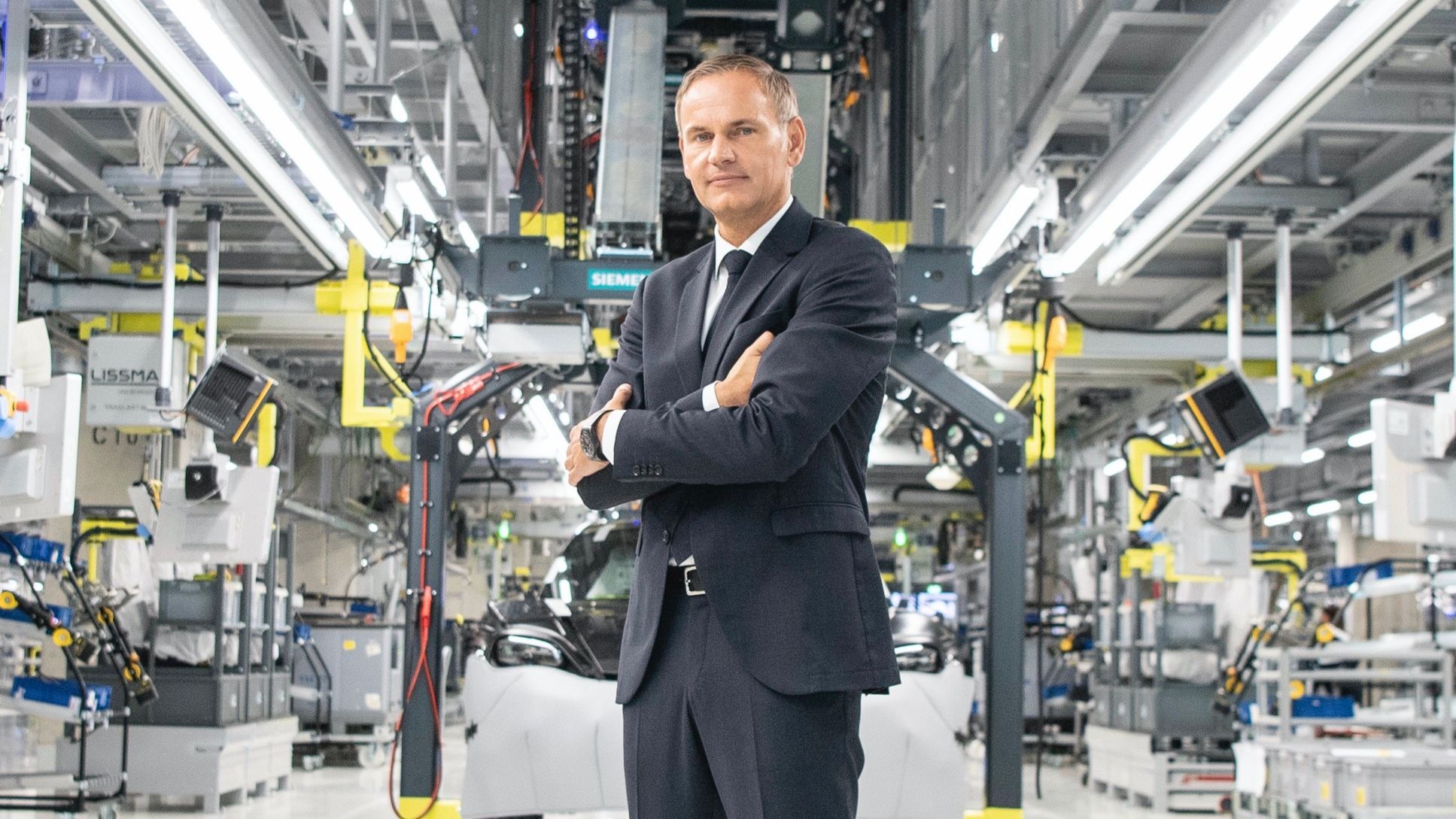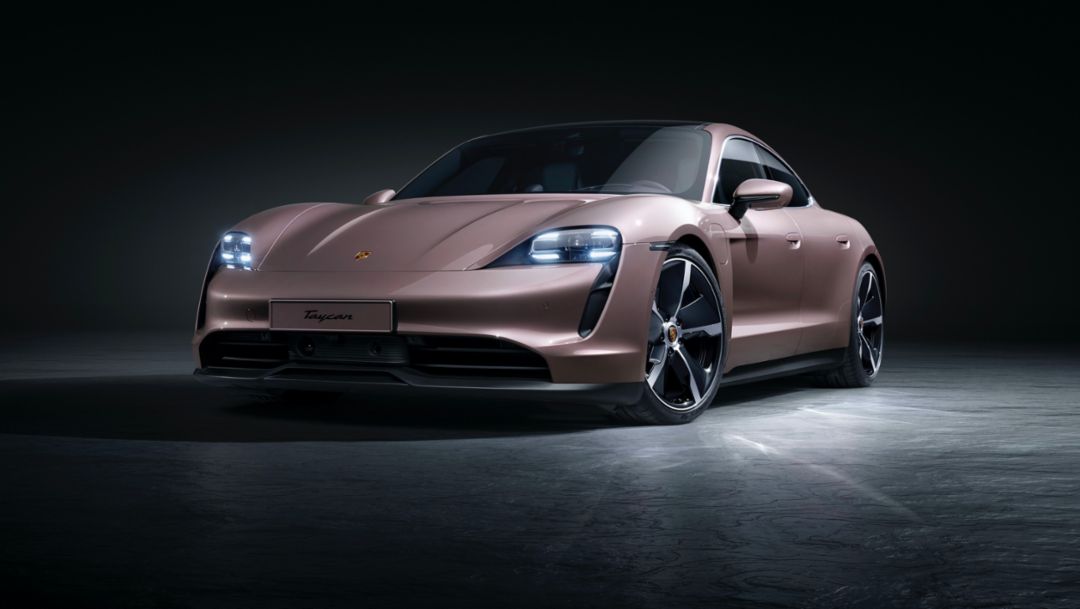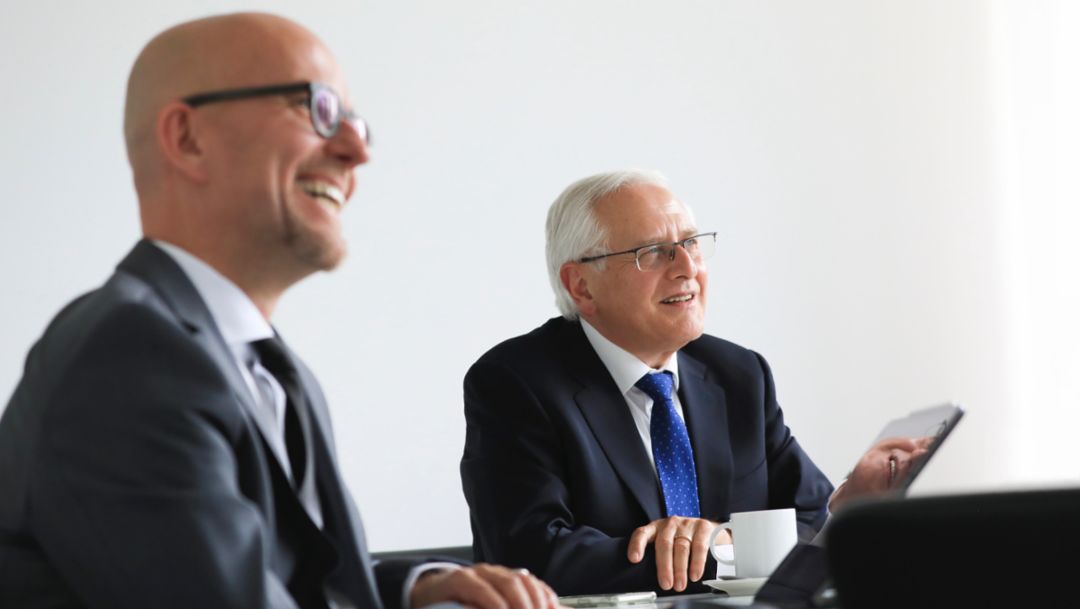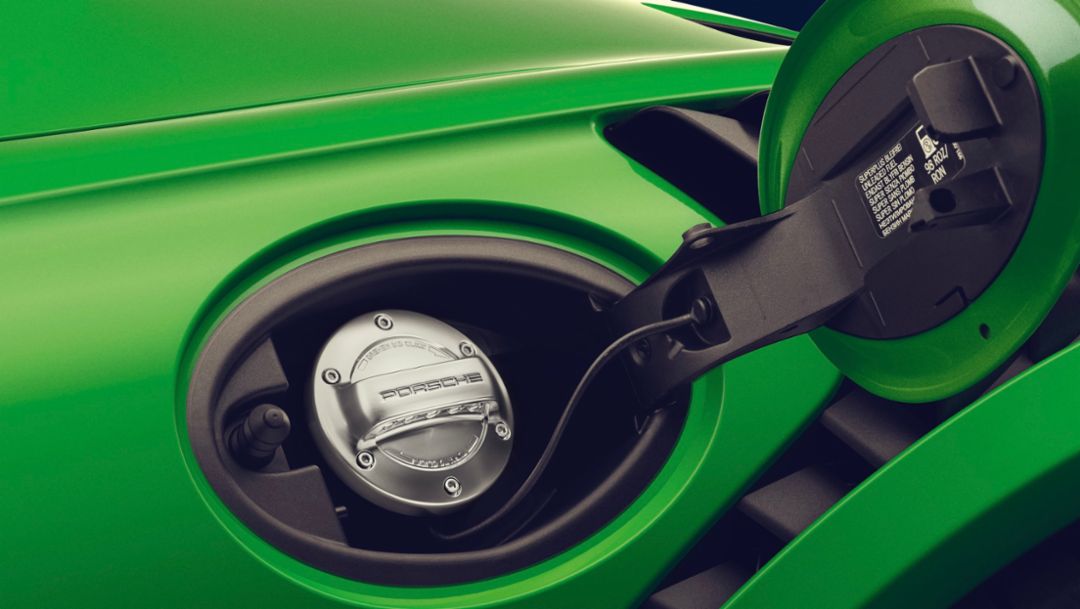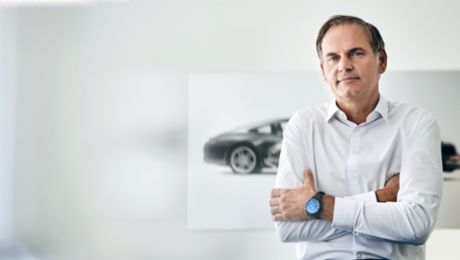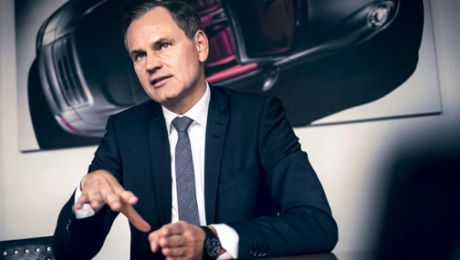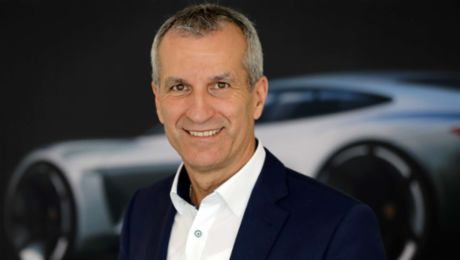It has become noticeably quieter than usual in front of the Porsche headquarters in Stuttgart, with strict work from home rules resulting in empty offices and deserted car parks. Despite this, Porsche CEO Oliver Blume is in the office for this interview – in a large meeting room on the first floor of the administrative building with plenty of fresh air, social distancing and masks.
Mr Blume, in the past year Porsche started with electrification with the Taycan. What’s next?
Oliver Blume: We have a marathon called transformation ahead of us. We have taken our first big step with the Taycan, and more will follow in the years to come. The all-electric Macan will be the next big milestone. In 2025, around 50 per cent of the cars we deliver will be electrically powered. The majority of these will be fully electric sports cars, with the remainder being sporty plug-in hybrids.
What is your share of electrification so far?
Blume: It’s looking really good. In Europe, one third of our cars were delivered as electric vehicles last year, half of them fully electric and half hybrids. Compared to the previous year, this is an increase of 60 per cent – our electric strategy is working. We have succeeded in transporting the sportiness that Porsche is known for to the new electric models. We wanted to sell 20,000 Taycans in 2020 and achieved this goal despite the coronavirus. The feedback from customers and experts is very positive. It is important to experience the vehicle.
What is being planned for the longer term, until 2025?
Blume: For us, the exclusivity of our sports cars is key. Unit numbers are not a relevant factor. But it is no secret that we will eventually sell more than 300,000 cars per year. Without coronavirus, we could probably have done that as early as 2020. But we have also set ourselves a market ceiling: Porsche always had a global market share of around 0.3 per cent. We intend to base our figures on that in the future, too.
"For us, the exclusivity of our sports cars is key. Unit numbers are not a relevant factor." Oliver Blume
The sales of the electric model Taycan have taken off, as you say. Do you have the required capacity in Stuttgart?
Blume: At the moment, we can flexibly produce more than 30,000 cars. In the end, the customers will decide with their orders how many cars it will eventually be.
You don’t want to compare yourself with Tesla?
Blume: I think Tesla’s development is impressive. Elon Musk is a cool guy and a great entrepreneur. Tesla is pursuing a different strategy and wants to achieve high unit numbers. That’s why new factories are being built all over the world. Porsche will maintain its exclusivity and smaller numbers. We fulfil the individual dreams of our customers.
But they are competitors. Have you gained Tesla customers with the Taycan?
Blume: We succeeded in that. However, when we developed our Taycan, Tesla was not the benchmark. We have always focused on our own products. For us, our guiding principle was that an electric Porsche must drive like a 911. This is something our customers can look forward to.
As part of Volkswagen, Porsche also has more clout than Tesla. However, it is surprising that the Group is using two dozen different formats for battery cells. How can such confusion happen?
Blume: We currently have a lot of battery variants and are already looking at them. You have to bear in mind that when we started planning electric cars a few years ago, there was not much experience in this technology and there were different approaches. With the knowledge we have today, we can look into the future and come to the right conclusions.
What exactly does that mean?
Blume: For the Volkswagen Group, we are standardising the geometric battery format with different performance ranges that are differentiated based on the chemistry inside the cell. The basis will be a cost-optimised volume battery, and there will also be a performance battery and a high-performance battery for the high-end segment. Porsche is especially committed to high power and energy densities for particularly sporty vehicles. The battery is the combustion chamber of tomorrow.
When will this be implemented?
Blume: A period of five years is realistic for the implementation of this concept, and we have already taken the relevant strategic decisions. Let us not deceive ourselves: in the coming years, there will be a major challenge to overcome in the field of battery cells, because there is a lack of capacity throughout the industry.
How has Porsche’s role in the Volkswagen Group as a whole developed?
Blume: Porsche has been part of the Volkswagen Group for a good decade now. During this time, a lot of positive things have happened. We benefit from economies of scale, for example when purchasing parts. The Group in turn benefits financially from Porsche. Our operating result has increased fivefold in this decade. We have developed from a junior partner to the most profitable brand in the Group. At the same time, this is a great responsibility. What Porsche generates also supports the transformation of other brands. True teamwork.
"We have developed from a junior partner to the most profitable brand in the Group.“ Oliver Blume
Are there also other areas in which Porsche is the ultimate benchmark in the Group?
Blume: Porsche is at the cutting edge of technology. We offer cutting-edge technology as a service provider for other brands. Examples are the most innovative electric models. The Taycan provides the technical basis for the Audi etron-GT. The hybrid platform for the Bentley Continental, Convertible and Flying Spur comes from the Porsche Panamera. We also work for the Group at a strategic level: as a small manufacturer, we can be bolder and faster. We initiated the transformation to electric mobility at a very early stage and are a driving force behind the Group’s strategy.
What is your situation as regards the coronavirus?
Blume: We need to be resolute now, and everyone has to make the best of it. Coronavirus is a stress test for all of us and health is paramount. In the automotive industry, the pandemic clearly shows who’s done their homework. Before and during the crisis. With our daily crisis management we were able to keep our company on track. It was also important for us to support society with the worldwide “Porsche helps” programme. Clear leadership, strong teamwork and real fighting spirit are more in demand than ever.
Did Porsche react quickly enough?
Blume: Yes, we did. Reacting quickly is important, but so is acting pragmatically – for example as regards costs. We were able to lower our break-even point further. At the same time, our sporty and innovative product range gives us a strong tailwind. All in all, we have done very well. The annual financial statement is always a bit like school report day. We are confident of achieving a double-digit return despite coronavirus. This is what we have been fighting for all year.
And when the pandemic is over, do you plan to achieve the usual profit margin of 15 per cent again?
Blume: Fifteen per cent will remain our strategic goal in the future, too. Even if it is significantly more ambitious in times of transformation. We are making substantial investments in electric mobility, digitalisation and the qualification of our employees. We also have high material costs for batteries. At the same time, we will still produce petrol and hybrid vehicles, as electric mobility is developing at different paces in the various regions of the world. Taken together, these are enormous costs. That’s why a 15 per cent return is as valuable today as 20 per cent used to be.
It seems like Porsche would have probably experienced strong growth last year without coronavirus? With a three per cent drop in sales, you are clearly ahead of the competition.
Blume: That’s true. Last year, we delivered more than 272,000 vehicles, only three per cent less than in the previous year. In a difficult environment, this is a great success for our team. The coronavirus shutdown affected all companies in the same way. We had to stop production for six weeks, and dealerships were closed for even longer in some regions. As a result, we were ultimately unable to achieve more than ten per cent of our planned annual sales.
To be able to afford the investments in new electric cars and digitalisation, Porsche has to cut costs. What specifically is being planned?
Blume: Our approaches go well beyond cost savings. Three years ago, we launched a comprehensive profitability programme: leveraging efficiencies and tapping additional sources of income. The positive effects have already helped us during the coronavirus crisis. To give concrete figures: by 2025, we will support our earnings by a total of ten billion euros. From then on, it should be three billion euros annually. We are making effective progress and have already developed more than 2,500 individual measures. The profitability programme is part of our everyday business today.
"Our approaches go well beyond cost savings. Three years ago, we launched a comprehensive profitability programme: leveraging efficiencies and tapping additional sources of income." Oliver Blume
Can you give us specific examples?
Blume: One example is digitalisation in vehicle development. We used to build a lot of prototypes for testing – at a cost of millions. Now a large amount of this development work is done digitally – just as well or better and at significantly lower cost. We are also trying to use more standard components across all product lines. In those areas where it has no significance for the identity of the products.
Will the almost infinite number of equipment options continue to exist?
Blume: Our focus is on additional equipment in the vehicle. We remove extras that are very rarely requested by our customers. I would compare this with the menu of a good restaurant: 100 dishes on the menu confuse the guest. Exclusive restaurants have only ten dishes on the menu, which are prepared to a high standard. We are the latter – but in the car industry. Nevertheless, every customer can get an individual vehicle, which we make possible through Porsche Exclusive Manufaktur.
Will Porsche take a breather in 2021?
Blume: You don’t have to worry about that. Last year we had extensive major launches with the new 911 derivatives and the Taycan. It was an enormous feat for our team. Our customers now have a great range of products to choose from. There will be some positive surprises this year and we will use the time to further optimise our processes. Then, in the following years, we will take the next leap with even more vigour.
Does it bother you that you now have to transfer Bentley to Audi?
Blume: No. For me, Bentley is a success story. In the past three years, we turned the company around completely. The Bentley team is doing a great job and has increased earnings by €300 million from 2018 to 2019 – with our support. The turnaround has been successful, Bentley is making money again. Even the coronavirus year 2020 closed with the numbers in the black. The product strategy is set for the future. The company will drive robustly into the future, prepared for a sustainable double-digit return.
But the separation is still sad, isn’t it?
Blume: Porsche’s job has been done. Bentley is better off with Audi in the premium luxury segment than with Porsche in the sporty segment. That’s why we're happy to hand the company over to Ingolstadt in a reorganised form.
Porsche is also involved in synthetic fuels and thus has a special role to play in the Volkswagen Group. Why?
Blume: Looking ahead, there is no alternative to electric mobility in order to achieve the CO₂ targets quickly and sustainably. Nevertheless, we have over a billion vehicles with a combustion engine on the road in the world today. At Porsche, we think of sustainability holistically. We want to be a pioneer in demonstrating that synthetic fuels can be an environmentally sound approach for vehicles that are already on the road. Methanol from production that is CO₂-free, converted into petrol, produced in places around the world where sustainable energy is abundant. Today’s engines and infrastructure can be used for this.
Is it then feasible to achieve appropriate prices for these synthetic fuels?
Blume: At the moment, the cost is still around ten dollars per litre. With the right quantities, it could become less than two dollars in the next ten years. From Porsche’s point of view in particular, this opens up a future perspective for our icon, the 911 – either with a combustion engine or as a very sporty hybrid. This means that we could continue to drive the car for many years into the future, which will certainly make our customers and fans happy.
Mr Blume, thank you for this conversation.
Info
Text first published in Handelsblatt.
Stefan Menzel and Martin Murphy asked the questions.
